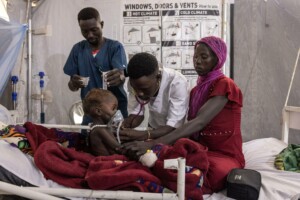Sudan OCHA bulletin 52: Central Darfur returnees to be relocated
On 16 December, the UN Refugee Agency (UNHCR) and the Sudanese Commission of Refugees (COR) conducted a verification mission to Central Darfur’s Muradaf village in Um Dukhun locality, to verify reports of the return of 30,000 people from refugee camps in Chad.
On 16 December, the UN Refugee Agency (UNHCR) and the Sudanese Commission of Refugees (COR) conducted a verification mission to Central Darfur’s Muradaf village in Um Dukhun locality, to verify reports of the return of 30,000 people from refugee camps in Chad.
22,617 people from the Salamat tribe have returned to Muradaf village this year, the UN Office for the Coordination of Humanitarian Affairs (OCHA) in Sudan reported in its last weekly bulletin of 2015.
As the village belongs to Fur tribesmen who are currently living in Um Dukhun camps for the displaced, the governmental Humanitarian Aid Commission (HAC) in Central Darfur is concerned that if the Salamat settle in Muradaf, Fur landowners will most probably raise objections.
According to HAC, the government plans to relocate the returnees to three areas in Um Dukhun locality to avoid possible conflict with the landowners.
The returnees are in need of emergency shelter and household supplies as well as water and sanitation services, according to findings of a multiple-agency mission conducted on 17 November.
The returnees fled their villages south of Um Dukhun town in 2013 when fierce fighting broke out between Misseriya and Salamat tribesmen. They lived in Abu Gadam refugee camp in Chad until June 2015 when the Chadian authorities decided to close the camp.
The refugees opted to return to Sudan but not to their areas of origin, as Misseriya tribesmen are still present in these areas.
Suspected dengue fever cases stand at 523
Between 29 August (when the outbreak started) and 18 December a total of 523 suspected dengue fever cases, including 104 deaths, were recorded by the Sudanese Ministry of Health.
The reduction in the number of cases and deaths comes after the exclusion of cases that did not match case definition. In Darfur, 473 suspected cases, including 99 deaths, were reported, in Kordofan, 44 suspected cases, including four deaths, and in eastern Sudan's Kassala town, six suspected cases, including one death.
In response, the World Health Organisation and the State Ministry of Health conducted health promotion activities in all affected localities reaching 13,600 people. In Central and West Darfur states, the UN Children’s Agency (Unicef) continued to support health and hygiene promotion activities. Unicef also supported radio discussions on dengue fever reaching about 549,000 people.
People in South Kordofan and Blue Nile need assistance
According to the latest Food Security Monitoring Unit October -November 2015 report, poor harvests, insufficient food stocks, and poor pastures for livestock has displaced people from South Kordofan’s Habila and Delling localities.
In Blue Nile State, 30,000 people in Chali and Wadaka villages, El Kurmuk locality, will need assistance through February 2016 also due to the poor harvest this year.
Fighting food insecurity by promoting local seed multiplication
Concern Worldwide (CW) and the Sudanese El Massar Charity Organisation for Nomads Development and Environmental Conservation, with support from the UK Department for International Development (DFID), is implementing a three-year programme called “Building Resilience and Adaptation to Climate Extremes and Disasters” (BRACED) in Sudan.
The programme aims to build resilience of families and communities by helping them improve their livelihoods in the context of climate stresses and shocks, ill-health, and inequalities. It also aims to strengthen local institutions such as communities, local authorities, and technical institutions to anticipate and predict for increasing variability seasonal conditions.
Targeting more than 100,000 men and women in pastoral and settled communities in North, South, and West Darfur states, the programme comes at the time when the country is starting to feel the climatic effects of El Niño on this years’ harvest.
Read the entire OCHA bulletin here











 and then
and then